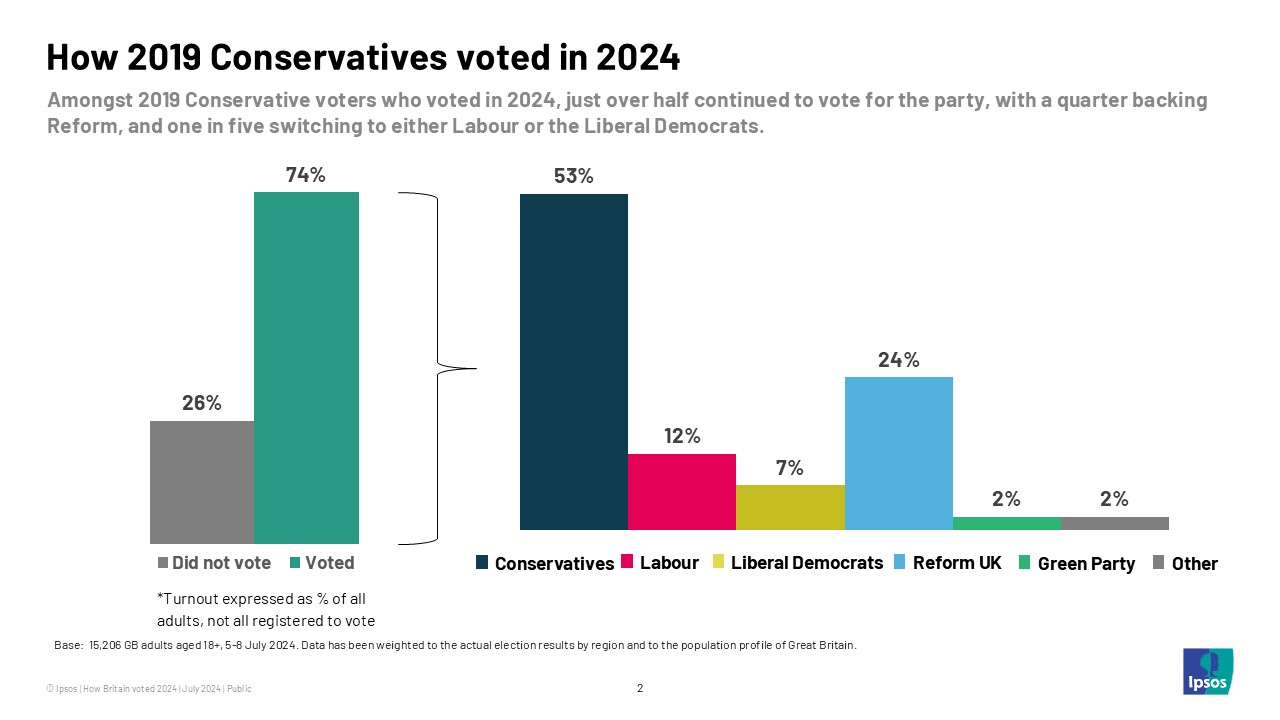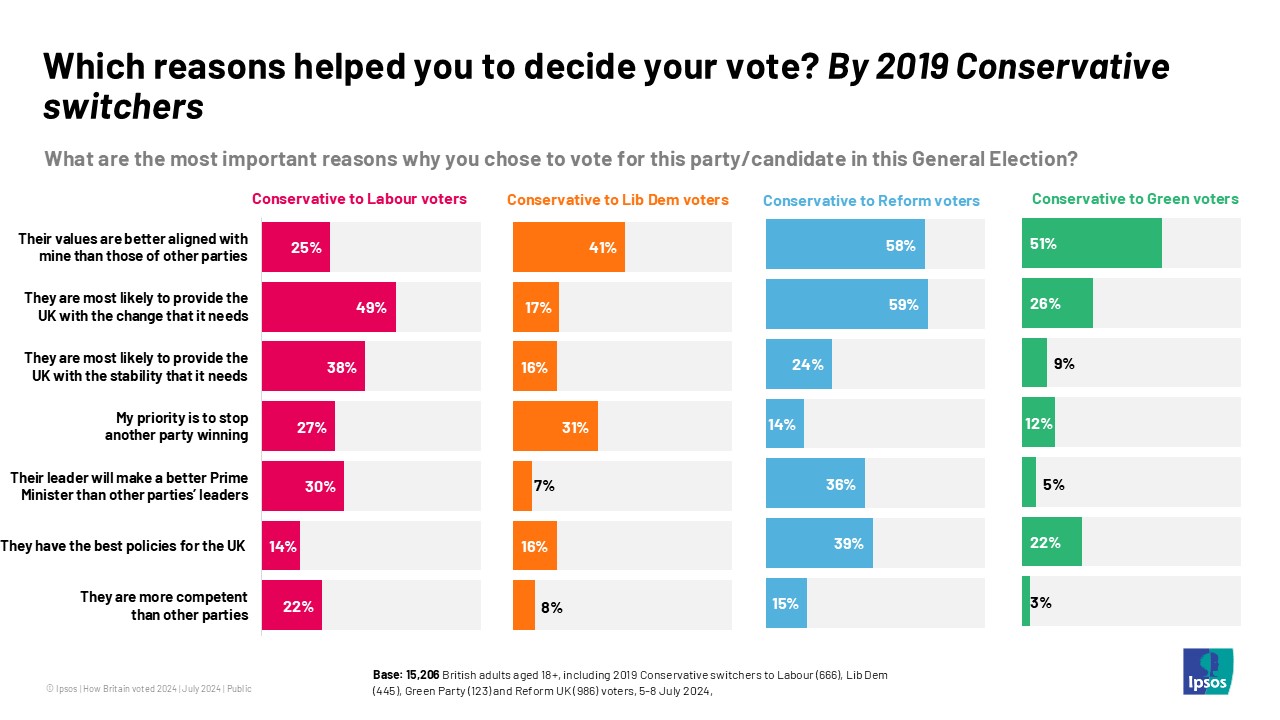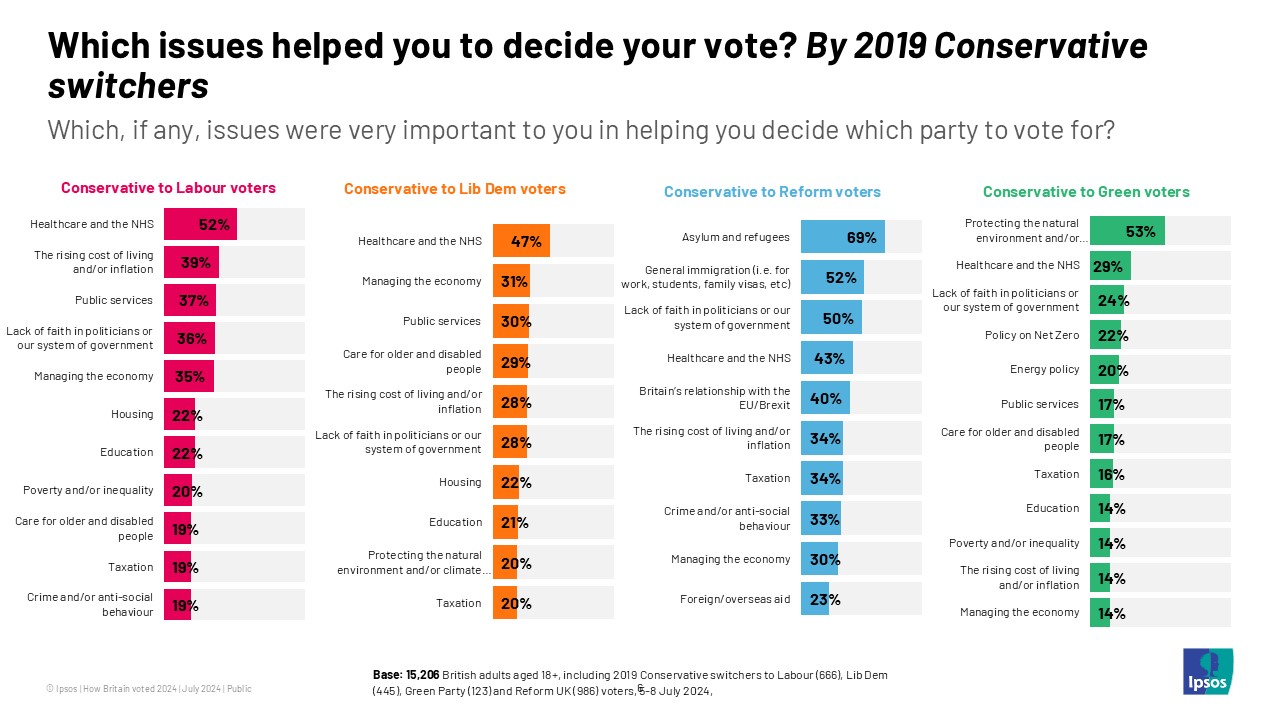No easy answers: new analysis from Ipsos examines why 2019 Conservative voters left the party in 2024
- Ipsos data shows almost half of 2019 Conservatives who voted in 2024 chose other parties. Switching to Reform UK, Labour and the Lib Dems for different reasons.
- Data suggests new leader will face a challenge building a winning coalition next time.
As part of our long running “How Britain Voted” series, Ipsos has released further data from our post-election survey of more than 15,000 voters (taken 5-8 July 2024). This data explores why some 2019 Conservatives abandoned the party this summer and shows there no easy answers for the party as they gather in Birmingham this week, with much focus on the current leadership contest.
Where did the 2019 Conservative vote go?
Ipsos data from interviews with n=4,909 2019 Conservative voters who voted in the July 4th General Election breaks as follows (our estimates suggest that in total 74% of 2019 Conservatives voted in the election, but a quarter – 26% - stayed at home). Just over half among those who did vote stayed with the Conservatives (53%) but one in four opted for Reform UK (24%). However, one in five voted for either Labour (12%) or the Liberal Democrats (7%) (and another 2% for the Greens). So Reform UK was the biggest single beneficiary, though almost as many switched to parties in the other direction (and who would have played an important role in direct Conservative-Labour or Conservative-Lib Dem battlegrounds).

Why did 2019 Conservatives switch?
When asked for the main reasons each group of switchers chose to back another party, differences emerge between groups. The 24% switching to Reform UK say the party was most likely to provide the change Britain needed (59%) and felt more aligned with its values (58%). Among the 12% switching to Labour, 48% said Keir Starmer’s party was most likely to provide the UK with the change it needs, 38% cited stability and 30% said the Labour leader would make the better Prime Minister. For Conservatives switching to the Lib Dems, 41% spoke of values but 3 in 10 (31%) also talked of tactical voting in that their priority was to stop another party from winning. Among those 2019 Conservatives who stayed loyal to the party, feeling aligned with its values was the most important reason (53%), followed by giving the UK stability (37%).

When asked which issues helped decide their vote there were clear differences between those 2019 Conservatives switching to Reform UK and those switching to other parties. Those switching to Reform cited asylum / refugees (69%) and general immigration (52%) along with a lack of faith in government / politicians / the system (50%) as key issues. Those switching to Labour and the Lib Dems primarily cited healthcare / the NHS (52% and 47% respectively) as the key issue, followed by others such as the economy and cost of living, and public services more broadly. The most important issues for Conservative loyalists were the economy (48%), taxation (40%) and pensions (39%).

Commenting on the finding, Ipsos Director of Politics Keiran Pedley says:
The findings highlight the problem the Conservatives face as they look to build a winning voting coalition in the future. Namely that those deserting the party in 2024 included different groups of people switching for different reasons. Those going to Reform UK prioritised issues like asylum and immigration whereas those opting for Labour and the Lib Dems prioritised the NHS and other topics such as the economy, cost of living and public services generally. The new Conservative leader will have to build an offer on all of these issues and convince quite different groups of voters the party shares their values, all whilst restoring the Conservatives’ reputation for competent government. It is no easy task.
Technical Note
Base: 17,394 GB adults aged 18+, of whom 15,206 said they voted, interviewed on the online random probability Ipsos KnowledgePanel between 5-8 July 2024. The data was weighted using our normal methodology to be representative of the adult population profile of Great Britain, and then the proportions of voters for each party and non-voters were weighted to the actual results by region. All polls are subject to a wide range of potential sources of error.






